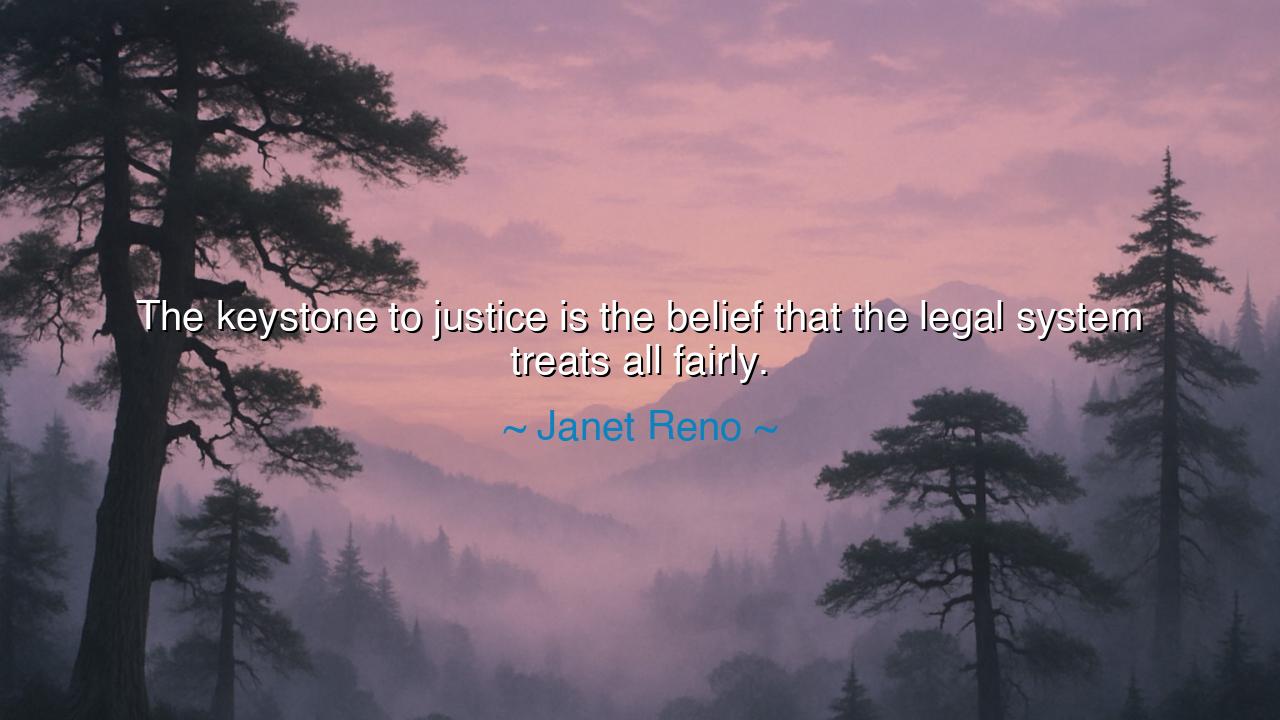
The keystone to justice is the belief that the legal system






Hear the solemn words of Janet Reno, the first woman to serve as Attorney General of the United States: “The keystone to justice is the belief that the legal system treats all fairly.” In this simple yet profound declaration, she strikes at the very foundation of law and order. For justice is not only in the written statutes, nor in the rulings of courts, but in the belief of the people that they are shielded by fairness. Without this belief, law is but a hollow shell, and authority becomes tyranny.
She speaks of the keystone, that ancient stone which crowns the arch and holds its weight together. Remove the keystone, and the arch collapses into ruin. So it is with justice: the keystone is not wealth, nor power, nor even punishment—it is the people’s faith that their system is impartial. If the poor and the rich, the weak and the strong, the native and the stranger, do not believe the law treats them equally, then the law loses its power to unite. Fear and cynicism replace trust, and the house of justice crumbles.
History teaches this lesson with clarity. In the days of Rome, the Republic rose upon laws that claimed to bind all citizens. Yet over time, corruption and favoritism seeped into the courts. The wealthy could bend rulings with bribes, while the poor were crushed by unjust verdicts. When faith in fairness dissolved, the Republic decayed, paving the way for emperors who ruled by might, not by justice. Thus, Reno’s words echo across centuries: the collapse of trust is the collapse of justice itself.
Consider, too, the story of the civil rights movement in America. African Americans, though promised equality under the Constitution, faced courts that often denied them fairness. Segregation, voter suppression, and biased juries revealed a system that treated some as less than others. Yet through struggle, through courage, through voices like Martin Luther King Jr. and Thurgood Marshall, the courts were challenged to live up to their own ideals. The case of Brown v. Board of Education restored belief that the law could be a force of fairness. It showed that when the keystone is strengthened, justice can again stand tall.
The deeper meaning of Reno’s teaching is that justice lives not only in reality, but in perception. A law may be fair in text, but if the people believe it favors some and not others, then its authority is weakened. This is why transparency, accountability, and equal access are essential. A system that hides its workings breeds suspicion, but one that opens itself to scrutiny strengthens faith. For justice is not only what is done, but what is seen to be done.
What lesson must future generations carry from this? It is this: guard the keystone. Do not allow corruption, favoritism, or discrimination to chip away at the people’s belief in fairness. Demand that the law protect the poor as surely as it protects the rich, the stranger as surely as the citizen. Support leaders who uphold impartiality, and hold accountable those who betray it. For once the keystone cracks, it is not easily repaired.
And to you, listener of these words, I say: live not only as one who obeys the law, but as one who insists upon its fairness. Speak against injustice, even when it does not strike you directly. Support your neighbor when they are treated unfairly, for in defending them you defend the keystone itself. Teach your children that justice is not a gift handed down by rulers, but a covenant held together by belief. When that belief thrives, the law stands firm; when it falters, the law falls silent.
Thus let Janet Reno’s words endure: the keystone to justice is belief in fairness. Protect this keystone, honor it, strengthen it, and pass it down unbroken. For upon it rests the arch of civilization itself, and without it, no society can long endure.






AAdministratorAdministrator
Welcome, honored guests. Please leave a comment, we will respond soon